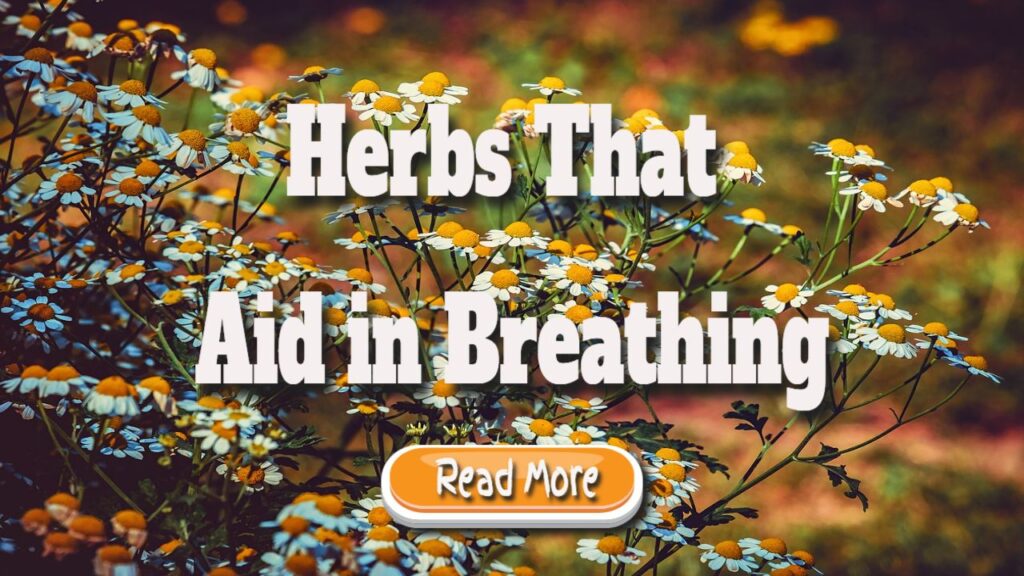Herbs That Aid in Breathing
Herbs That Aid in Breathing: Breathing is something we all do without thinking about it, but it is a complex and necessary process. Our lungs absorb oxygen from the atmosphere and expel carbon dioxide.
This gas exchange permits our bodies to function properly. Many people experience breathing difficulties at some point in their lives, whether as a result of asthma, pneumonia or simply a congested nose after a cold or virus.
Traditional drugs are frequently the first line of treatment prescribed by doctors. Some people, however, discover that modifying their diet and introducing particular herbs into their lives helps with breathing problems in a more natural way.
Because they include ingredients that reduce congestion, many herbs can aid with breathing problems. You may need to explore a little to find the herbs that work best for you. Before beginning any herbal treatment, consult with your doctor, especially if you are already on medicines. This is due to the fact that herbs can mix with certain drugs and cause you harm. You should be able to locate herbs that help you breathe easier with a little trial and error.
Herbs can be used to treat a wide range of diseases, particularly those related to respiratory health. Sage, for example, is a herb that may be brewed into a tea and used to treat asthma or bronchitis
If you have respiratory difficulties and want to try herbal therapies, liquorice root is another fantastic alternative. Glycyrrhizin, a chemical found in liquorice root, has anti-inflammatory qualities and can help reduce asthma symptoms. The medicine works better when combined with inhaled asthma treatments.
Ginger
Is another common plant that is frequently used to alleviate respiratory issues, particularly in the winter. Ginger is extremely helpful when combined with liquorice root and hot water to make tea. Together, they help to relieve a congested nose and make breathing easier.
Peppermint has traditionally been used to treat respiratory problems. It is an excellent alternative for people who suffer from asthma or bronchitis, or who just have a congested nose. It aids in the opening of the airways due to its anti-inflammatory effects. It reduces the size of irritated nasal mucous membranes, making breathing easier and allowing air to flow freely into the lungs.
Peppermint leaves and hot water can be combined to make a delightful tea. Peppermint oil can also be used to open the sinuses and reduce congestion. Peppermint is also anti-inflammatory since it kills the microorganisms that create inflammation in the first place.
The menthol component of peppermint is one of the reasons behind its effectiveness. Menthol is the herb that springs to mind first when it comes to aiding breathing. Menthol is a natural bronchodilator, which means it relaxes the muscles around the airways. It destroys bacteria and has anti-inflammatory effects that aid in the relief of breathing issues. Inhaling a few drops of menthol in a bowl of hot water can be quite beneficial in treating respiratory disorders such as asthma.
You've probably smelled menthol in cough and cold treatments such as Vicks Vaporub. This chest rub has been utilised by both children and adults for years. I'm sure we all remember our mothers fondly massaging it on our chests when we were little and sick with a cold. It aids in the clearing of congested nostrils and makes breathing easier.
Along with camphor, eucalyptus is a component in Vicks Vaporub. Eucalyptus is a natural decongestant that can aid in the treatment of colds and flu. It can also aid in the relief of congestion and the opening of the airways. Eucalyptus oil can be used in a diffuser or directly applied to the skin. Eucalyptus is an excellent choice for an all-purpose plant that aids in breathing. It is extremely beneficial for asthma and sinusitis.
When we are sick, another fragrance that helps us breathe is camphor. It is an active element in several over-the-counter cold medicines, such as chest rinses and nasal sprays. It aids in the removal of mucus that clogs nasal passages.
Hay fever season could be one of the reasons we're having trouble breathing. This happens frequently in the spring and summer when flowers and grasses discharge pollen. This causes sneezing and trouble breathing due to histamines, an allergic reaction. There are over-the-counter antihistamines available to treat this seasonal ailment, but herbs are also beneficial if you don't want to take medicine. Echinacea is one of these herbs. It improves immunity, aiding in the protection of the body against the effects of pollen. Nettle and butterbur are two other natural antihistamines.
Lungwort is a herb that may be beneficial to persons who suffer from respiratory issues. It is a traditional cure for asthma and other respiratory ailments that have been proved to be beneficial in treating these issues.
Plantain leaves (not those from the banana plant family) are another fantastic choice for respiratory health. It is a natural expectorant that can aid in the loosening of mucus and the ease of breathing. Plantain leaves can be made into a tea or consumed as a supplement.
Horseradish is well-known as a spice, but it is also a powerful home cure for colds. It has long been used to open sinuses and cure congestion, sneezing, and coughing symptoms (15).
Here's a recipe for a natural decongestant that takes advantage of the potent anti-inflammatory properties of ginger and horseradish.
You'll need:
1 inch peeled and grated fresh ginger
cayenne pepper, 1/8 teaspoon
1/4 cup peeled and grated horseradish
Put everything in a small jar and cover it with apple cider vinegar. Put the lid on the jar and shake it vigorously to incorporate the ingredients.
As needed, take 1-2 tablespoons per day. The combination will stay in the refrigerator for about 2 weeks.
Currently, marshmallows, myrrh, liquorice, ivy, and elderberry have been discovered as herbs that show potential outcomes for persons suffering from Covid 19 coronavirus respiratory difficulties. However, as previously stated, it is best to get the opinion of a physician before self-medicating with herbs and plants, especially if you have respiratory difficulties.
Breathe joyfully!
The post Herbs That Aid in Breathing appeared first on https://gqcentral.co.uk















